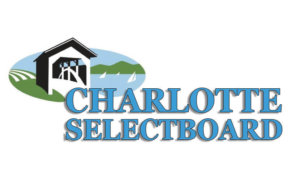Selectboard wrestles with conflict-of-interest definition and enforcement for a small town
Another Charlotte board meeting—another conversation about conflict of interest.
This time it was the selectboard.
And this time it wasn’t a conversation born out of conflict, but out of a desire for money. Namely, American Rescue Plan Act funds (often referred to as ARPA).
 The selectboard’s conflict of interest discussion at its Feb. 14 meeting came about as a result of town administrator Dean Bloch reading between the lines of American Rescue Plan Act guidelines that indicated to him it would be good idea for the selectboard to have a well-thought-out conflict of interest policy—with an enforcement mechanism.
The selectboard’s conflict of interest discussion at its Feb. 14 meeting came about as a result of town administrator Dean Bloch reading between the lines of American Rescue Plan Act guidelines that indicated to him it would be good idea for the selectboard to have a well-thought-out conflict of interest policy—with an enforcement mechanism.
“The American Rescue Plan Act guidelines refer to a federal statute that requires an enforcement mechanism in conflict-of-interest policy,” Bloch said.
Enforcement could be as simple as putting the name in the minutes of a board member that violated a town-approved conflict of interest policy, Bloch said, or it could be asking for a conflict-of-interest violator’s removal.
The town just needs to decide that if the conflict-of-interest boom needs to be lowered on an offending board member, what that boom will be. Whether it will be hard and heavy or more of a Nerf boom needs to be established beforehand in order to be in strict compliance and not threaten the town’s American Rescue Plan Act funds.
Bloch said he had talked to the Vermont League of Cities and Towns, and it is unclear to him if the need for a conflict-of-interest enforcement policy just pertains to the selectboard or to all of the town boards.
Since coming on the selectboard, Lewis Mudge has done most of the heavy lifting on the board’s work on conflict of interest. It was one of the issues he campaigned on.
Because of all the money the town is supposed to get from the American Rescue Plan Act, “we should probably get moving on this because we definitely don’t want to be not in compliance,” Mudge said.
In looking at conflict of interest policies at towns around the state, Mudge said, he found towns with clearly laid out enforcement mechanisms with step-by-step policies about how they are enforced. Other towns’ policies are like Charlotte’s, which he characterized as “one-pager aspirational statements.”
“In light of some recent events,” Mudge said, “the board needs to get cracking on this admittedly boring but important work.”
“We really want to make sure the language is something that we’re comfortable with and we think is going in the right direction,” Mudge said. “We don’t want something that’s wordy and complicated, just to be complicated.”
As the board went over his first draft of a conflict-of-interest policy, the members got hung up by the phrase “fourth degree of consanguinity.” The draft says individual board members should not decide issues on which they have a personal or financial interest nor their family members to the fourth degree of consanguinity. This term expands the family members whose interest in an issue should preclude a board member from a decision way out into the twigs of the family tree, including great-great-grandparents, great-great-grandchildren and first cousins by way of marriage.
Mudge agreed with board member Louise McCarren’s assertion that “the simpler the better” should be a guiding principle in the Selectboard’s conflict of interest policy. In his first draft, he said, he’d followed a “kitchen sink” approach, throwing everything in with the expectation the board would whittle it down.
Development review board member Charles Russell commented from the audience that when the zoning board was working on its conflict-of-interest policy it struggled with what personal interest meant. He said that now-defunct board changed it to personal interest or involvement.
Mudge concurred that personal interest is “a really broad category in a small town.”
The Vermont League of Cities and Towns has a sample of a conflict-of-interest policy, but that organization doesn’t think every town should adopt the same policy but each should develop its own, Mudge said.
Realizing this lexicographical inquiry could continue well into the night, chair Jim Faulkner suggested the discussion about conflict of interest be added to the agenda for the board’s next meeting.
Mudge said it will take at least two more meetings.
The conversation ended with the members encouraging each other to reflect upon conflict of interest during the week.
His first draft is “a very imperfect document,” Mudge said. “We certainly weren’t going to agree upon this document tonight.”

